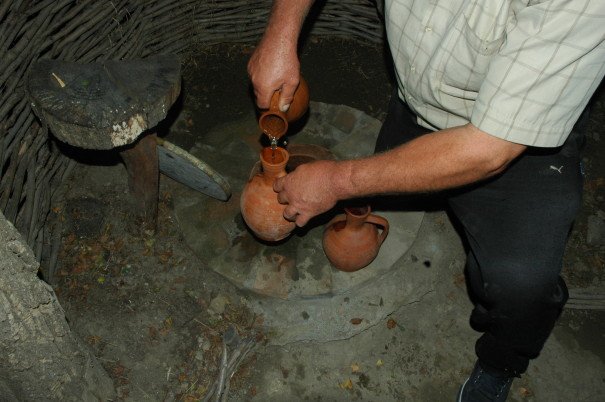
Candid Camera in Georgian Wine Country

Candid Camera in Georgian Wine Country
Walking down a dirt road in Imereti, Georgia, I approached the gate of a worn but nice-looking one-story house. There was a yard with goats, broken farm equipment, and a man about 70, staring at me in astonishment. I tried not to look at the camera hidden off to my left, then, repeating the Georgian I’d been practicing all morning, I glanced at my map and turned to him. He immediately gestured me in. I was the third foreigner he’d seen in the last 15 minutes.
“Hello?” I said.
“Yes! Stay for some wine!”
”Oh, I can’t, thank you. I’m just wondering…”
“Town! Yes! Town is that way! Where are you staying tonight? Don’t stay anywhere but here!”
“Thank you! I’m not staying. But please…” I touched my throat.
“Yes! Have some wine!”
“No, thank you. Could I have some water, though?”
“Of course! Help yourself! And wait, for God’s sake!” His son, maybe 45 years old, came running out of the house and thrust into my hands a half-dozen churchkhela: strings of nuts coated in a dry skin made of thickened grape juice, a handy snack for travelers. “At least take some food if you won’t have wine!”
Clutching the snacks, I headed back up the road out of sight to rejoin my foreigner-cohorts and the camera crew. In 2007, the national news program Droeba had been taking the three of us to various villages to accost residents for a Candid Camera–style puff piece testing Georgia’s legendary hospitality. Guests here are gifts from God, or possibly gods in disguise. And, as (probably) the birthplace of viniculture, it’s nearly taboo not to offer said guests some (usually homemade) wine, if not a larder-clearing feast.
Our job: Appear one after another, each as a weary traveler. Ask for directions and water (nothing stronger, thank you), and let the cameras capture whether and how fervently the eastern Kakhetian or northern Gorian would attempt to herd us into his house for roast pork, garlic chicken, fried eggplant with walnuts, and, of course, some house-made wine from one of the literally hundreds of unique varietals of grape that grow there.
The gag tended to end with the cameramen emerging from the bushes, followed by the proffered feast. I had a great time, and very much enjoyed the almost black saperavi we drank in Eastern Kakheti, and the dry white rkatsiteli we shared with the crew in a restaurant after we were rebuffed in Gori. (The birthplace of Stalin only offered us water.)
But I wasn’t prepared for the frenzied earnestness of the mark/host in Imereti, the superlatively hospitable central-western region where I’d heard of unsuspecting hikers getting dragged back to shepherds’ huts for hours of cheese, drink, and ancient folk songs. As we each—an Asian-American, an Indian, and a white American—walked up to that house and refused to stay, the host became so desperate about feasting us that the improbability of our visit seemed beside the point. As the last visitor, I saw him practically trembling with anticipation. When we returned with the camera crew, the producer attempted to explain, but the farmer cut him off, shouting: “I don’t care! Are you finally going to stay and have some wine?!?”
Finally, we did. The farmer’s family set up tables in a small outdoor shed covering the tops of about a dozen kvevris, or clay wine casks buried in the ground, which Georgians have been using for almost eight millennia. He broke one open, dipped in a jar, and pulled out a pinkish blush that had been aging for five years. I never found out what grape it was made from, but it smelled astoundingly like strawberries, and tasted both dusty and bright, with a fair amount of tannins. He poured it into traditional clay drinking bowls for us, and then he said a toast. He watched carefully and proudly as we drank.